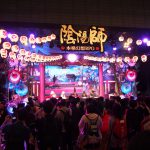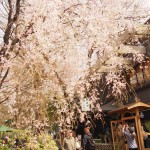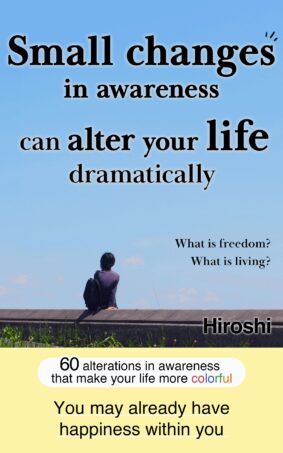Great Quotes of Anohana in Japanese!!
Anohana is so heart-touching anime and made many of us cry many times, I think.
I even went to the theater to watch it.
This 2021, Anohana celebrated the 10th year of its release on TV.
And I watched all the episodes again.
Here, I introduce you some of the quotes which touched my hearts in both Japanese and English!
※ This article includes spoiler, so I’m glad you come back here again after watching the anime if you haven’t seen Anohana yet
Quotes by Jintan(Yadomi Jinta)(宿海仁太)(やどみじんた)
Everyone’s changed… That’s not it. The one who’s changed the most… is me
みんな変わっちまったんだ。いや、一番変わっちまったのは、俺、なんだよな
みんな means “Everyone”.
Past tense of 変(か)わる is “変わった”.
変わっちまった is a bit rough way like a slung.
By using “んだ” in the end of the phrase, we can find that he talks to himself like convincing himself.
一番 (いちばん) is “Top” or “First”.
俺(おれ)なんだ means “(That’s) I am”.
Jintan told Menma that they (his friends) changed a lot.
Not like before.
But he understood that he was the one who changed most among them.
It was a little sad scene.
I thought I could just apologize tomorrow. But that tomorrow… never came.
あした謝りゃいいやって思った。だけどその明日は永遠に来なかった
あした is “Tomorrow”
謝(あやま)る means “Apologize”.
謝りゃいいや means “I can apologize and things will be OK”
If I say it in a normal Japanese way, it becomes “謝ればいい”.
だけど is “But”.
明日(あした) is “Tomorrow”.
This time Kanji 明日 is used for あした, not hiragara.
Because あした was just Jintan’s guess and his thoughts.
明日 is real, not imagination but reality.
To stress the difference (あした in his mind and 明日 in reality), they used Hiragana and Kanji next, I think.
永遠(えいえん) means “Forever”.
来(こ)なかった means “Didn’t come”.
Past tense of 来(く)る is 来(き)た.
And here なかった is used, so opposite meaning of 来る.
Jintan thought he could apologize Menma for what he said to her the next day.
But the day he imagined never came.
That was a sad scene.
I felt like this word also tells us like we should do it now if we really want, or we do regret later.
I’ve always wanted… …the tomorrow after that day… …the tomorrow I could apologize to Menma
オレは、欲しかった。ずっと、あの日の明日が、めんまに謝れる明日が、欲しかった
欲(ほ)しかった means “I wanted”.
Past tense of 欲しい is 欲しかった.
ずっと means “Long time”, that is, “I’ve always”.
あの日 means “That day”.
So, it is a special day.
謝(あやま)れる comes from 謝ることのできる.
That means, “(The tomorrow) I’m able to apologize”.
When Jintan jumped out of his house to search for Menma, he finally notices what he really wanted in a real sense.
What he really wanted was the tomorrow he could apologize to her.
Look at me!
お前ら俺を見ろ!
お前 means “You”.
Adding ら it becomes “You all (guys)”.
お前 is not a polite word, rather rough word.
見ろ is “Look at”.
This is an instruction.
Jintan tried to attract other students’ attention to help Anaru out who was the center of attention in class.
She got misunderstood by classmates as she did compensated dating.
Jintan tried to protect her claiming she was the last one to do such a thing.
It must have required him great courage as he had been a shut-in.
Still, Anaru was his friend and he believed her, so he took all the attention for her.
Now, it wasn’t only me, but all of us who brought each own interest in sending Menma back. We weren’t being honest to her wish… So sorry, Menma…
おれだけじゃなかった。 めんまの成仏に自分勝手な気持ち持って、 めんまの願いを真剣に考えてやれなくて…… めんま、ごめんな。ごめんな。
成仏(じょうぶつ) means “To enter into nirvana”.
自分勝手(じぶんかって) means “Selfish/Self-centered”.
気持(きも)ち means “Feeling”.
願(ねが)い means “Wish”.
真剣(しんけん)に means “Seriously”, “In earnest”.
ごめん is “Sorry” but here な is added in the end.
By adding な, the word comes to have more strong and warm feeling like talking right in front of the person.
If he was a girl it becomes ごめんね instead of ごめんな.
All the friends had inner thoughts and all of them felt guilty.
Jintan was not the only one who had a private reason to grant Menma’s wish and had a sense of guilt.
All of them had been living until today with something in their heart.
Jintan says sorry for Menma gently.
Thank you for granting a wish, Menma
願い、叶えてくれてありがとな。大好きだ、めんま
叶(かな)える is “Grant”.
Usually, this 叶える is used with 願い (Wish).
ありがとな makes a bit more closer than just say ありがとう.
Like saying I understand you for doing something, so thank you.
Jintan thought he and all the friends were striving for Menma but it was for him after all.
Menma’s wish was for Jintan.
And it was also for all the members of Heiwa Busters.
Quotes by Menma(Meiko Honma)(本間芽衣子)(ほんまめいこ)
I knew it, mom. I really knew that I was already dead…
知ってるよ。めんま、自分が死んじゃったことぐらい、知ってるよ
知(し)ってる means “I know”.
死(し)んじゃった means “Died”.
In ordinary conversation, it is said or written 死んだ or 亡くなった.
Children use this way of expression んじゃった, especially.
Certainly, Menma is a child, so nothing strange to say like that.
Her mother said at her household altar that Menma might not notice that she died.
Seeing it, Menma whispers “I know it”.
Thinking about Menma’s feeling and the destiny, that was a bit sad moment to see.
Yeah, I know. He is. Jintan is a really cool guy
そうなんすよ、かっけぇーんすよ。じんたんは
そう means “Yes” or “So”.
なんすよ is a funny way, isn’t it.
Often Kouhai uses this way of saying for Senpai.
It is a kind of polite way but conveys a bit rough character of the person.
Only boys use this なんすよ especially for Senpai.
Here Menma just imitated the way.
かっけぇー comes from かっこいい.
かっこいい means “Cool”.
Young generation sometimes use the word かっけぇー like “So cool”.
Jintan was working for Menma and the staff said he worked hard.
Popo replied “かっけぇーんすよ。じんたんは (Jintan is cool)”.
Seeing it, Menma repeated the word Popo said.
She had always known that since she was a little child.
I promise, I promise to make Jintan crying!
わかった!めんま、約束する!じんたん絶対泣かす!
わかった is “I get it”.
約束(やくそく)する means “I promise”.
絶対(ぜったい) is “Definitely”.
泣(な)く is “Cry”.
泣かす is an assertion “To make someone cry”.
This was the promise Menma made with Jintan’s mother.
Mother of Jintan worried about him as he tried to be strong, not to cry or selfish, after she hospitalized because of disease.
She felt sorry for him and Menma said to her she makes him cry, no matter what.
That’s sweet and kind of her.
Jintan is crying again. But what I like most is your smile
じんたん、また泣いた。でもね、めんま本当は、じんたんの笑った顔が好き
でもね means “But”.
Usually, only でも is used.
Children often add ね in the end and it makes a bit cute expression.
But depends on the case adults also add ね to put one’s feeling and to stress the theme or opinion.
Seeing Menma disappearing, Jintan cried.
Menma told him that he cried again but what she like was smile of his.
She wants him to keep smiling.
You really found me
見つかっちゃった
見(み)つかる is a passive form of 見つける.
見つける is “Find”.
ちゃった comes from past tense of した (Did).
ちゃった is a cute way and also conveys a bit mischief character of the person depends on the case.
The nuance is like “Oh, I did it, haha”.
It is like a feeling of bashfulness while laughing.
Menma wanted to say her final goodbye.
She wanted them to find her.
And finally they found her.
So, she said “You found me”.
It was so her saying “見つかっちゃった” with a smile.
Quotes by Anaru (Anjo Naruko) (安城鳴子)(あんじょうなるこ)
I’m the one… who should be ashamed
みっともないのは、わたしだ
みっともない is a state of “Look absurd” or “Embarrassing”.
It also conveys nuances such as “Lame/Uncool/Miserable”.
It is usually used for some else, not for yourself.
Anaru told Jintan this みっともない first as he keep shutting himself away without going to school.
But after coming back home, she felt that was not Jintan but herself.
She felt frustrated with herself who can not do anything after all.
I know I’m telling you something really ugly of me now, OK?
私、ね。今から、すっごく性格の悪いこと言うよ?
性格(せいかく)の悪(わる)い means “Bad character”.
すっごく comes from すごく (Very).
Very is the word to stress something but by using “っ (small つ)”, it stresses the word much more.
こと is “Thing”.
Usually, 性格の悪い is used for a person as it’s about a character.
So, it is not natural to use it for Thing (こと).
Here, Anaru focused on the thing itself and wanted to stress the thing which is very bad, so she made unnatural remark consciously.
This unnatural expression conveys her strong sense of guilty.
She confesses that she was relieved when Jintan said “I don’t like you” to Menma when he was a child.
Because Anaru liked him very much.
But the next day Menma died.
Since then, she had been feeling pain with her heart.
I think many people think like Anaru if they face the same situation.
And don’t feel such a strong sense of guilty like Anaru.
From this incident, I could feel she is very honest and very warm person.
The reason I like Jintan is, that’s because you work hard for Menma
私が好きなのはめんまのためにがんばるじんたんだから
がんばる means “Strive”, “Take efforts”.
だから is “That’s because”.
This is a kind of complex of Anaru.
Without Menma, Jintan goes stale, loses his energy and Anaru doesn’t want to see such a sad Jintan.
Thanks to Menma, he looks shine but Anaru also feels he loves Menma, not her.
I wanted her to just leave, not for her wish but for my own sake… They (Kamisama) must have known that
願いを叶えてあげたいんじゃなくて、自分のためにめんまを成仏させたかった。そういうの神様に見抜かれてた
神様(かみさま) is “Deity”.
In Japan, we don’t have God, just a few people believed in God, Buddha, etc.
So, it is always difficult to translate 神様 to me as if I translate it directly like God, Deity, etc. the nuance readers take becomes different from what we have.
So, what Anaru meant here is not like she believes in religious kind of God.
As an abstract concept, like a charm children use, she used the word 神様.
見抜(みぬ)かれる comes from 見抜く.
見抜く means “Read someone’s mind”.
By using れる from される, it becomes passive form.
By granting Menma’s wish, they thought they could make Menma enter nirvana but couldn’t after all.
Then, Anaru confesses that that’s because she did it not just for Menma but also for herself.
Out of an impure motive, she did it and that’s the reason they couldn’t make it.
She was really honest and has a pure heart in a way.
Quotes by Popo (Tetsudo Hisakawa)(久川鉄道)(ひさかわてつどう)
If running away now, then you’ll make the same mistake, Jintan!!
ここで逃げたら同じことになるぞ、じんたん!
逃(に)げたら is made of 逃げる and したら.
逃(に)げる means “Run away”.
This たら comes from したら.
したら means “If one does something”.
In this case, “If you run away”.
They tried to recreate the situation, the past which Jintan still regrets.
Jintan said “I don’t like you” to Menma when he was a child.
They recreated the same situation but it was for Jintan to face the past again.
Jintan tried to run away as he could not stand the situation but Poppo sopped him.
Poppo knew that Jintan keeps running away forever if he doesn’t face the past now.
What’s wrong with that… Whatever feelings you’ve got, it won’t be as bad as doing nothing!
いいじゃねえかよ。どんな気持ちだって、何もしないより、よっぽどいいじゃねえかよ!
いい or よい means “Good/Fine”.
じゃねえかよ comes from じゃないか.
ねえか is a bit rough way and mainly only men use.
By adding よ in the end, it stresses one’s strong feeling like “What’s the matter” and coveys nuance of asking agreement to one’s thoughts.
よっぽど comes from よほど.
よほど means “Very/Quite/Much”.
Like the case of すっごく before, by using っ, it stresses the word much more.
When others confessed impure motives to grant Menm’s wish, Poppo shouted better than nothing.
Certainly, that’s true.
At least, all of them tried to do something while suffering, didn’t stand by doing nothing.
Goodbyes aren’t a one-sided affair!
お別れってよ、どっちか片方が言うもんじゃねぇだろ!
お別(わか)れ means “Good bye” or “Farewell”.
片方(かたほう) is “One side/The other side”.
Rough expressions are used, so if I translate the sentence in standard way it becomes like this
“お別れってさ、どちらか片方が言うもんじゃないよね”
This is a normal and more soft way.
The rough way represents Popo’s character but it also reflects close relationship among them, you know, like even a rough way can not become rough, rather warm feelings.
Last word だろ means “Isn’t it”.
You can also say でしょ.
This is a great word of Popo.
Certainly, farewell is made up not just from one person but from two people.
He thought about Menma to the end.
He also wanted to give her back. saying thank you.
Quotes by Yukiatsu (Atsumu Matsuyuki)(松雪集)(まつゆきあつむ)
We are left behind
俺達は、取り残されちまってんだ
取(と)り残(のこ)される means “Left behind”.
ちまってんだ is a rough way.
Ordinary way is 取り残されてしまっている.
By using ちまって, it reflects his character and irritation or frustration about things at the same time.
Yukiatsu told the word to Anaru on the train.
They grew up after the accident and live an ordinary life in high school, still, they live with the past.
They are left behind in the past like the train stopped in the tunnel.
Thanks to you, I managed to keep standing right place in several meanings. I owe you one
お前のおかげでいろいろ踏みとどまれたよ。ありがとな
おかげ is “Thanks to”.
いろいろ means “(Various) Things”.
踏みとどまれた is the past tense of 踏みとどまる.
踏みとどまる means “Barely resist” or “Hold out”.
ありがとな comes from ありがとう.
By adding な in the end, it comes to have a kind of warm and more emotional nuance like “I’m telling you this now right in front of you, thank you”.
If you are a girl, it’ll be ありがとうね.
Atsuyuki said thank you to Tsruko who watched over him.
Leave things to Atsuyuki without interfering or butting in, that was her kindness.
Quotes by Tsuruko (Chiriko Tsurumi)(鶴見知利子)(つるみちりこ)
Why are you always losing your temper when about Meiko Honma? You both are in the same side, aren’t you?
あーあ…なーに熱くなってんの?本間芽衣子のことになると人が変わるのってさ、あんたも同じじゃない、松雪くん?
あ~あ means “Well well”.
It implies a kind of disappointment and discourage but the speaker do not care as it is none of one’s business.
熱(あつ)くなる means “Get heated”, “Lose ones temper”.
It’s a kind of slung.
人(ひと)が変(か)わる means “Become a different person”.
You can use this phrase when you see someone suddenly changed his character for some reason.
あんた is a rough way of “あなた”.
To include insult, she used あんた here.
Atsuyki lost his temper when he heard the name Menma from Jintan’s mouth.
“Are you still saying such a thing”, he told Jintan.
After Jintan left, Tsuruko told Yukiatsu you are also same.
They both still linger in the past, the memory of Menma, after all.
Please let them be for a while… It might be the last opportunity for him. If he’s got missed it, he’d never be able to…
お願い、あのまま..。チャンスなのよ。これ逃しちゃったら、きっと、もう……
お願(ねが)い means “Please”.
あのまま means “As it is”, so here it means “As they are (without interference)”.
逃(のが)しちゃったら comes from combination of 逃す and したとしたら.
逃す means “Slip/Miss” and したとしたら means “If one did something”.
きっと means “Surely”.
It reflects speakers’ private strong emotion of “I think”.
もう is usually used with a negative word such as Never.
It implies vague emotion like “Maybe not (Impossible) from now on”.
Here, the word finished without any negative word following and that makes us understand her emotion of she can’t continue or do not want to continue to the next phrase.
Atsuyuki grabs Jintan saying “Do you think I’m OK?”.
Popo tried to step in between them but Tsuruko told him saying not to.
She felt now is the last chance they can let out everything.
Without talking their own minds to each other, they can not go further, she felt.
She couldn’t make out without wearing some disguise, too
衣装やらで何かに変わらなきゃやり過ごせないんでしょ、いろいろ
衣装(いしょう) is “Clothes”.
変(か)わらなきゃ comes from combination of 変わる and もし~しなければ.
変わる means “Change”.
もし~しなければ means “If one doesn’t”.
変わらなければ(なきゃ) means “If one doesn’t change”.
やり過(す)ごす means “Get away with”, “Pass away”, “Withstand”.
やり過ごせない is a negative form, so the meaning is opposite of やり過ごす.
Atsuyuki saw Anaru on a railway platform and whispered why Anaru carry a shopping bag.
Then, Tsuruko told him what she carried would be clothes.
She can not stand the reality without disguising herself, so she changes clothes after school and hang out with her friends in town.
By doing that, she can forget about herself and reality which faces her, Tsuruko implies.
Summary of Great Quotes of Anohana
Each members of Cho Heiwa Busters strived for Menma.
They lived life with a sense of guilty but reunites for Menma.
Making her wish comes true was the only way Menma could leave this world, they thought, at least.
But after all, it was opposite.
To grant Jintan’s mother’s wish and make members of Cho Heiwa Busters get along like before, Menma appeared.
So, Jintan said “Thank you for granting a wish” to Menma in the last scene.
I also like the quotes by Popo “Goodbyes aren’t a one-sided affair!”.
They always thought about other members.
The reason they suffered a lot was they had a strong bond even though they were separated.
By speaking their minds to each other, they finally reunite in a true meaning and find Menma at last.
6 white flowers put on the place Menama left and they are now in full bloom.
Anohana (The Flower We Saw That Day)
Official Website (Anime)
https://www.anohana.jp/
PV (YouTube)
https://youtu.be/kpeCOzKvK-0
Source of Quotes
https://www.anohana.jp/ (Original Work : Cho Heiwa Busters, Director : Tatsuyuki Nagai, Scriptwriter : Mari Okada)













